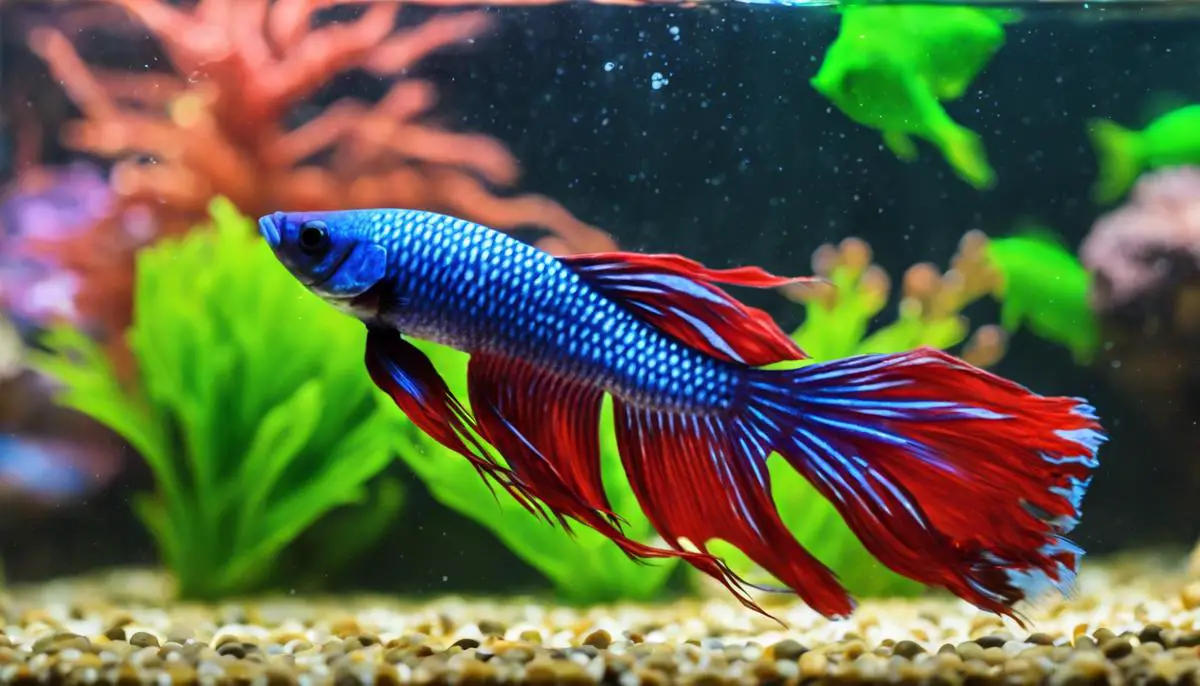Betta Fish Longevity: Common Health Issues and Prevention

What is the Average Lifespan of a Betta Fish?
The average lifespan of a Betta fish is around 2-4 years. However, with proper care, some Betta fish can live as long as 5 years.
Genetic and Environmental Factors
The life expectancy of Betta fish is influenced by both genetic and environmental factors. Selective breeding practices aimed at creating visually appealing Betta fish can sometimes lead to health problems, such as weakened immune systems or physical traits that hinder their quality of life. For example, Betta fish bred to have large, heavy fins may struggle with swimming, leading to stress or physical damage.
Environmental factors, particularly water quality, play a crucial role in Betta fish longevity. These fish require clean, oxygenated water with a temperature between 76 to 80 degrees Fahrenheit. Poor water conditions, including inappropriate temperatures, high ammonia levels, and low oxygen levels, can significantly shorten a Betta’s lifespan. Proper cycling of tanks is essential to prevent the accumulation of harmful toxins.
Tank size is another important factor, with Bettas thriving in tanks of at least 5 gallons. Smaller environments can restrict healthy swimming patterns and increase stress levels, impacting their immunity and making them more susceptible to diseases.
Betta fish enthusiasts can take steps to enhance their pet’s longevity by providing engaging activities that mimic natural behaviors, such as exploring and hunting. A varied diet that meets their nutritional needs can also help foster a stronger immune system capable of fighting off potential illnesses.
While genetic predispositions set a baseline, environmental factors play a significant role in determining the actual life expectancy of Betta fish. Responsible breeding practices combined with proactive and attentive care can help mitigate genetic vulnerabilities and promote a longer, healthier life for these cherished aquatic pets.

Diet and Nutrition
Proper nutrition is essential for maintaining the health and extending the lifespan of Betta fish. As carnivores, their natural diet consists mainly of insect larvae and small crustaceans, which provide them with the protein they need.
Live foods, such as brine shrimp, bloodworms, and daphnia, offer essential nutrients and stimulate natural feeding behaviors. However, live food can also introduce pathogens to the aquarium, so it is important to source them from reputable suppliers. Freeze-dried options are a safer alternative, although they may lack some nutritional benefits. Rehydrating freeze-dried food before feeding can help prevent bloating and constipation in Betta fish.
Betta-specific pellets are a convenient feeding option, formulated to meet their dietary needs. High-quality pellets should list fish or other meats as their primary ingredients rather than fillers like wheat or rice. The size of the pellet is also important, as overly large pellets can be difficult for Bettas to consume and may cause digestive issues.
Overfeeding is a common problem that can lead to unhealthy weight gain and water pollution from uneaten food. It is best to offer small amounts that the Betta can consume within a few minutes, once or twice a day, to mimic their natural feeding patterns and support optimal health.
A balanced approach to diet, incorporating a variety of live, freeze-dried, and high-quality pelleted foods, aligns with the Betta fish’s natural dietary preferences and helps maintain their health. Proper feeding practices, along with an understanding of the importance of variety and moderation, can significantly impact the well-being and life expectancy of these aquatic companions.

Common Health Issues and Prevention
Common health issues in Betta fish often stem from suboptimal tank conditions, stress due to incompatible tankmates, and inadequate aquarium maintenance. By understanding these issues, owners can take preventive measures to minimize the risk of disease and ensure the health of their fish.
Poor water quality is a major cause of health problems in Bettas. Fin rot, characterized by fraying or disintegration of the tail and fins, is often accompanied by bacterial infections. Ammonia poisoning, indicated by red or lilac gill coloring and lethargy, highlights the importance of proper water cycling and filtration. These conditions can lead to stress, reducing the fish’s immune system and making them more susceptible to infections.
Even in clean water, Bettas can experience stress-induced diseases when housed with incompatible tankmates. Constant flaring, a display of aggression or defense, can exhaust Betta fish and increase their vulnerability to illnesses. Bettas are naturally solitary and can become stressed in crowded environments.
Early detection of health issues is crucial for preventing the escalation of treatable conditions. Ich, or white spot disease, appears as distinctive white speckles on the Betta’s body and fins. Raising water temperatures and using appropriate medication can help treat this condition.
Regular tank maintenance is essential for preventing the accumulation of factors that can lead to Betta health problems. This includes substrate siphoning, partial water changes, and using dechlorinated water to minimize chemical stress on the Betta’s labyrinth organ.
Preventive measures, such as quarantining new aquatic additions and taking a conservative approach to tank enhancements, can minimize exposure to pathogens and contaminants. Regularly inspecting tank inhabitants for irregularities in appearance and behavior, and fostering a balanced ecosystem with aquatic plants, can also contribute to the overall health of Betta fish.
In summary, preventing common health concerns in Betta fish requires an integrative approach to their care. By creating an environment that closely resembles their natural habitat and monitoring for early signs of disease, owners can actively contribute to the longevity and well-being of these beautiful aquatic pets.

- Panprommin D, Kaewpunnin W, Insee D. Effects of pellet shapes and sizes on growth performance and feed utilization of Betta splendens Regan, 1910. Agric Nat Resour. 2019;53(3):237-242.
- Velasco-Santamaría Y, Corredor-Santamaría W. Nutritional requirements of freshwater ornamental fish: a review. Rev MVZ Cordoba. 2011;16(2):2458-2469.
- Yanong RP. Nematode (roundworm) infections in fish. Cir Dept Fish Aquat Sci. 2002;91:1-9.
